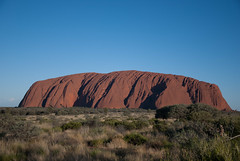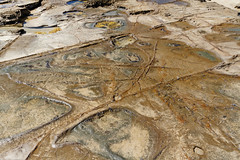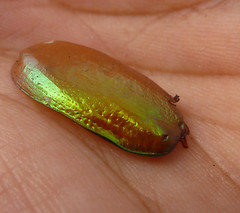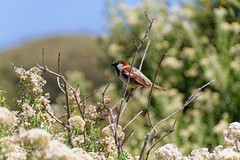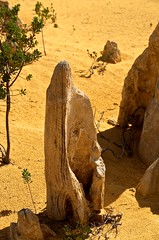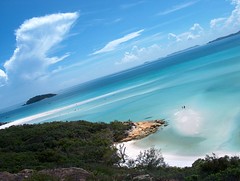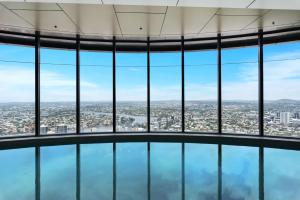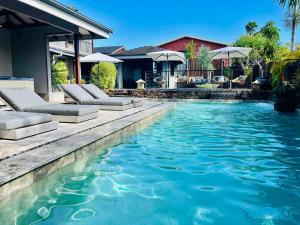 Australia
Australia
Australia, officially the Commonwealth of Australia, is a sovereign country comprising the mainland of the Australian continent, the island of Tasmania, and numerous smaller islands. Australia is the largest country by area in Oceania and the world's sixth-largest country. Australia is the oldest, flattest, and driest inhabited continent, with the least fertile soils. It is a megadiverse country, and its size gives it a wide variety of landscapes and climates, with deserts in the centre, tropical rainforests in the north-east, tropical savannas in the north, and mountain ranges in the south-east.
The ancestors of Aboriginal Australians began arriving from south-east Asia approximately 65,000 years ago, during the last ice age. Arriving by sea, they settled the continent and had formed approximately 250 distinct language groups by the time of European settlement, maintaining some of the longest known continuing artistic and religious traditions in the world. Australia's written history commenced with the European maritime exploration of Australia. The Dutch navigator Willem Janszoon was the first known European to reach Australia, in 1606. In 1770, the British explorer James Cook mapped and claimed the east coast of Australia for Great Britain, and the First Fleet of British ships arrived at Sydney in 1788 to establish the penal colony of New South Wales. The European population grew in subsequent decades, and by the end of the 1850s gold rush, most of the continent had been explored by European settlers and an additional five self-governing British colonies established. Democratic parliaments were gradually established through the 19th century, culminating with a vote for the federation of the six colonies and foundation of the Commonwealth of Australia on 1 January 1901. This began a process of increasing autonomy from the United Kingdom, highlighted by the Statute of Westminster Adoption Act 1942, and culminating in the Australia Act 1986.
Australia is a federal parliamentary constitutional monarchy, comprising six states and ten territories. Australia's population of nearly million is highly urbanised and heavily concentrated on the eastern seaboard. Canberra is the nation's capital, while its most populous city and financial centre is Sydney. The next four largest cities are Melbourne, Brisbane, Perth, and Adelaide. It is ethnically diverse and multicultural, the product of large-scale immigration, with almost half of the population having one parent born overseas. Australia's abundant natural resources and well-developed international trade relations are crucial to the country's economy, which generates its income from various sources including services, mining exports, banking, manufacturing, agriculture and international education. Australia ranks amongst the highest in the world for quality of life, health, education, economic freedom, civil liberties and political rights.
Australia has a highly developed market economy and one of the highest per capita incomes globally. Australia is a regional power, and has the world's thirteenth-highest military expenditure. It is a member of international groupings including the United Nations; the G20; the OECD; the World Trade Organization; Asia-Pacific Economic Cooperation; the Pacific Islands Forum; the Pacific Community the Commonwealth of Nations; and the defence/security organisations ANZUS, AUKUS, the Five Eyes and the Quadrilateral Security Dialogue. It is a major non-NATO ally of the United States.
Etymology
The name Australia (pronounced English: /əˈstrliə/ in Australian English) is derived from the Latin ("southern land"), a name used for a hypothetical continent in the Southern Hemisphere since ancient times. Several sixteenth century cartographers used the word Australia on maps, but not to identify modern Australia. When Europeans began visiting and mapping Australia in the 17th century, the name was naturally applied to the new territories.
Until the early 19th century, Australia was best known as New Holland, a name first applied by the Dutch explorer Abel Tasman in 1644 (as) and subsequently anglicised. still saw occasional usage, such as in scientific texts. The name Australia was popularised by the explorer Matthew Flinders, who said it was "more agreeable to the ear, and an assimilation to the names of the other great portions of the Earth". The first time that Australia appears to have been officially used was in April 1817, when Governor Lachlan Macquarie acknowledged the receipt of Flinders' charts of Australia from Lord Bathurst. In December 1817, Macquarie recommended to the Colonial Office that it be formally adopted. In 1824, the Admiralty agreed that the continent should be known officially by that name. The first official published use of the new name came with the publication in 1830 of The Australia Directory by the Hydrographic Office.
Colloquial names for Australia include "Oz" and "the Land Down Under" (usually shortened to just "Down Under"). Other epithets include "the Great Southern Land", "the Lucky Country", "the Sunburnt Country", and "the Wide Brown Land". The latter two both derive from Dorothea Mackellar's 1908 poem "My Country".
History
Indigenous peoples
Indigenous Australians comprise two groups: the Aboriginal peoples of the Australian mainland (and surrounding islands including Tasmania), and the Torres Strait Islanders, who are a distinct Melanesian people. Human habitation of the Australian continent is estimated to have begun 50,000 to 65,000 years ago, with the migration of people by land bridges and short sea crossings from what is now Southeast Asia. It is uncertain how many waves of immigration may have contributed to these ancestors of modern Aboriginal Australians. The Madjedbebe rock shelter in Arnhem Land is recognised as the oldest site showing the presence of humans in Australia. The oldest human remains found are the Lake Mungo remains, which have been dated to around 41,000 years ago.
Aboriginal Australian culture is one of the oldest continuous cultures on Earth. At the time of first European contact, Aboriginal Australians were complex hunter-gatherers with diverse economies and societies and about 250 different language groups. Recent archaeological finds suggest that a population of 750,000 could have been sustained. Aboriginal Australians have an oral culture with spiritual values based on reverence for the land and a belief in the Dreamtime.
The Torres Strait Islander people first settled their islands around 4000 years ago. Culturally and linguistically distinct from mainland Aboriginal peoples, they were seafarers and obtained their livelihood from seasonal horticulture and the resources of their reefs and seas.
European exploration and colonisation
The northern coasts and waters of Australia were visited sporadically for trade by Makassan fishermen from what is now Indonesia. The first recorded European sighting of the Australian mainland, and the first recorded European landfall on the Australian continent, are attributed to the Dutch. The first ship and crew to chart the Australian coast and meet with Aboriginal people was the Duyfken captained by Dutch navigator, Willem Janszoon. He sighted the coast of Cape York Peninsula in early 1606, and made landfall on 26 February 1606 at the Pennefather River near the modern town of Weipa on Cape York. Later that year, Spanish explorer Luís Vaz de Torres sailed through and navigated the Torres Strait Islands. The Dutch charted the whole of the western and northern coastlines and named the island continent "New Holland" during the 17th century, and although no attempt at settlement was made, a number of shipwrecks left men either stranded or, as in the case of the Batavia in 1629, marooned for mutiny and murder, thus becoming the first Europeans to permanently inhabit the continent. In 1770, Captain James Cook sailed along and mapped the east coast, which he named "New South Wales" and claimed for Great Britain.
Following the loss of its American colonies in 1783, the British Government sent a fleet of ships, the First Fleet, under the command of Captain Arthur Phillip, to establish a new penal colony in New South Wales. A camp was set up and the Union Flag raised at Sydney Cove, Port Jackson, on 26 January 1788, a date which later became Australia's national day. Most early convicts were transported for petty crimes and assigned as labourers or servants to "free settlers" (non-convict immigrants). While the majority of convicts settled into colonial society once emancipated, convict rebellions and uprisings were also staged, but invariably suppressed under martial law. The 1808 Rum Rebellion, the only successful armed takeover of government in Australia, instigated a two-year period of military rule. The following decade, social and economic reforms initiated by Governor Lachlan Macquarie saw New South Wales transition from a penal colony to a civil society.
The indigenous population declined for 150 years following settlement, mainly due to infectious disease. Thousands more died as a result of frontier conflict with settlers.
Colonial expansion
The British continued to push into other areas of the continent in the early 19th century, initially along the coast. In 1803, a settlement was established in Van Diemen's Land (present-day Tasmania), and in 1813, Gregory Blaxland, William Lawson and William Wentworth crossed the Blue Mountains west of Sydney, opening the interior to European settlement. The British claim extended to the whole Australian continent in 1827 when Major Edmund Lockyer established a settlement on King George Sound (modern-day Albany). The Swan River Colony (present-day Perth) was established in 1829, evolving into the largest Australian colony by area, Western Australia. In accordance with population growth, separate colonies were carved from New South Wales: Tasmania in 1825, South Australia in 1836, New Zealand in 1841, Victoria in 185…
Hotels Australia
Looking for places related to Australia?
Those are other destinations to find places related to Australia:



